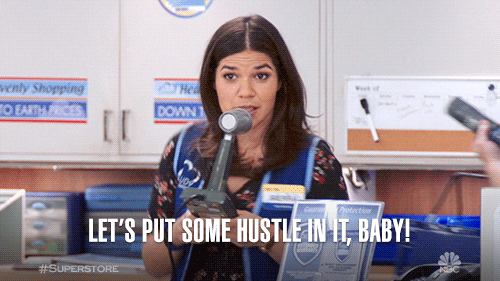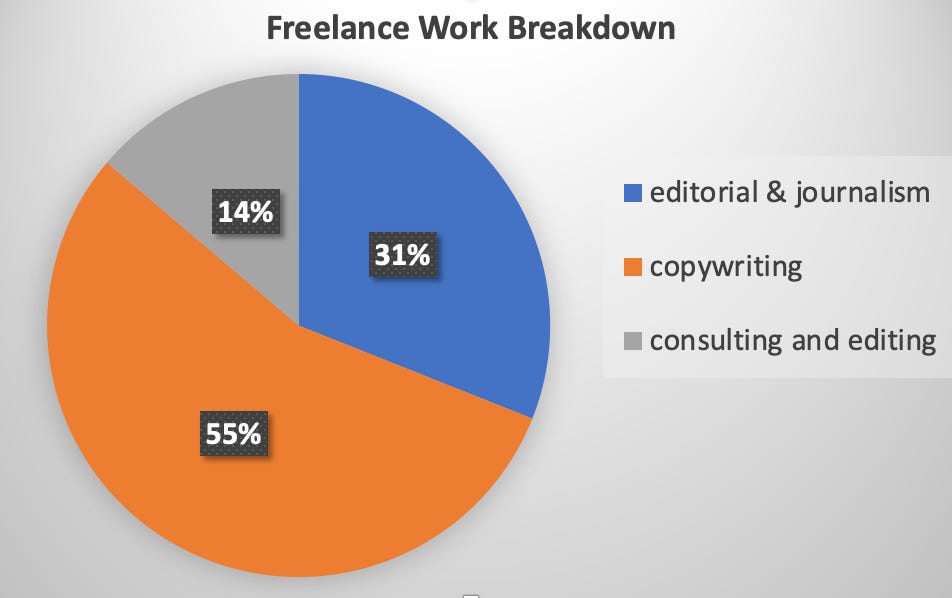The Freelance Parent is currently a free service-based newsletter aimed at helping its subscribers thrive professionally and personally. If you find this week’s issue helpful, please consider supporting the newsletter by donating £3 here and sharing with your friends. Don’t forget your donation can be claimed as an expense against your business too.
At the end of 2020, the hashtag #freelancepie was trending on Twitter (amongst the freelance community anyway). Started by freelance journalist Anna Codrea-Rado, freelancers from all walks of life began to share how their income was split by way of colourful pie charts. From journalism, to copywriting, podcasting, public speaking, teaching and consulting, it was such an insightful exercise in seeing how diverse so many freelancers’ incomes really are.
For me personally, I found it really comforting too. As a copywriter, editor and journalist, I have a few strings to my bow and, at times, this can cause a bit of the dreaded imposter syndrome. Can I really refer to myself as a journalist if it doesn’t make up 100% of my income, and can I call myself a senior copywriter even if I don’t dedicate my entire career to it? After many years of self doubt, I've come to realise that the answer is of course, yes. Putting on different hats doesn’t take away from the skill needed to fulfil any of these roles. In fact, it probably strengthens them.
The reason I left my full-time job as a managing copy editor was because I found it restrictive and well, a little bit dull, to do the same work every day. And, when I applied for other roles - whether freelance or permanent - I also found myself being pigeon holed. Editors from magazines, for example, were confused as to how my skills as a copy editor would transfer to more editorial work. When in reality, I was already doing it via the freelance work I was doing on the side. I just needed to work on how the wider professional world saw me.
But that all changed when I became a freelancer and was able to in a way, reinvent myself – not to mention combine and monetise my talents. I could choose how I marketed myself and bring the most relevant parts of my experience front and centre. I could also give myself permission to go after long-held dreams such as getting bylines in some of my favourite publications without an employer finding out and assuming I wasn’t committed to my full-time job.
Another reason I like to combine copywriting and editing with journalism and editorial work is because truthfully, copywriting tends to pay better in most cases and is more fruitful (in my experience and opinion). So it keeps the money coming in consistently while allowing me the time to pitch journalistic subjects that take a bit more time to think about. (Such as this piece I wrote for Grazia last week) on intrusive thoughts on motherhood, and the benefits of volunteering for Underpinned).
One way I believe that this works for me is also because I have a niche. Aside from a couple of anomalies, most of my work falls under fashion, beauty, lifestyle (and now parenting) which makes it easier for clients to join the dots and avoid me being labelled as a Jack of all trades. I can then show my offering clearly on my portfolio by simply splitting my best work into sub categories of ‘copywriting’, ‘digital’ and ‘print’.
I've also come to realise, that many, many freelancers diversify their incomes. And not only is it a good way of maintaining cash flow and future proofing a business, but it is also part of the fun.
Jem Collins, Editor and Director of Journo Resources, believes that having a variety of income streams is always helpful as a freelancer – especially in her particular field of journalism. “Personally, I think that having a ‘side hustle’ or other income stream outside of journalism is actually a really useful thing. Sometimes we can get a bit worried or precious about if it makes us any ‘less of a journalist’ but for the most part I think that pressure is something we impose upon ourselves,” Jem says. “And the same goes for any other creative area. We attach a lot to our professional identity, but a lot of us go freelance for the flexibility, and the type of work we do should be included in that”.
“Having a diverse set of skills is both creatively rewarding and good business sense,” she continues. “For example, knowing my way around social media campaigns is what got me through the tricky parts of lockdown, when no one wanted shifts. It’s also a skill set that absolutely helps make my work in other areas better and more rewarding. Being freelance is all about building the career you want - and gives you the chance to explore new areas”.
For freelance journalist Rachael Davies, making more time for the areas of work that she really cares about has been instrumental in helping them to grow. “When I first started freelancing, I had zero time management strategies in place, which meant I always had to rush for deadlines and prioritise the highest paying work,” she explains.“Now, I know that journalism is a smaller segment of my income but it's what I want to focus on more. I started blocking out my time, so I know that Monday afternoons and Wednesday mornings are when I work on personal projects like my newsletter”.
“Tuesdays are for pitching, and Thursdays and Fridays are when I do most of my client work. It also gives me an idea of how much work I can take on if a new client comes up, and gives me a much-needed structure to my week”. In 2021, using this time management structure has helped Rachael get a lot more journalistic commissions and other work that she really cares about.
So how do you split your time as a freelancer and are you actively trying to grow certain areas or cut back on others? Let me know with a tweet or a comment below. I’d love to see your own freelance pie charts too.
Further reading
Complied and written by Rebecca Redford
The rise of the freelance journalist: Tough times and lockdown prompt boom in online networks
The Press Gazette explores the way the freelance industry boomed during the first lockdown, with the community rallying together to set up different groups and initiatives. John Crowley speaks to successful freelance journalists Lily Canter and Anna Codrea-Rado about this.
Where the freelance work is
In addition to running the ‘Freelancing for Journalists’ community, Emma Wilkinson and Lily Canter also create a weekly podcast. In this episode, Emma and Lily discuss the importance of venturing out of mainstream media and working with different news outlets with travel writer David Whitley and film journalist Tasha Jagger.
Working as a freelance journalist is hard right now but not impossible. Here’s some advice.
The pandemic has impacted the careers of many freelancers and created much uncertainty. Here Meena Thiruvengadam shares her experiences and how she ‘pivoted’ her way through 2020.
Should you specialise or diversify?
This article on Underpinned is an interesting and balanced take on diversifying your income. Louise Quick asks, should you specialise in one field or is best to use your list of skills to delve into a variety of different roles within the industry?





